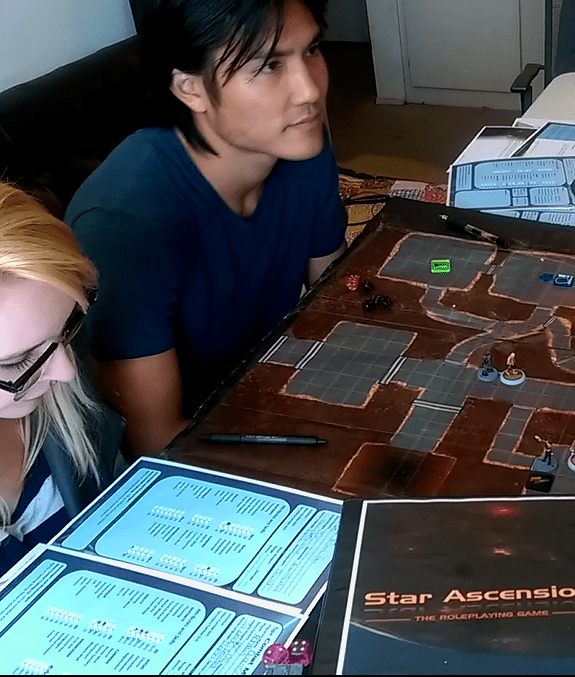
“Aren’t RPGs complicated?”
“Is it like a board game?”
“Do I have to read the WHOLE 200 page rulebook?”
“Is it harder than chess?”
You love to play RPGs. You’d love to have people to play them with, but maybe you’ve had trouble introducing friends to this awesome hobby. Getting a group together is one of the biggest challenges I’ve heard from people who are into roleplaying games but seldom get to play.
The problem only gets worse as we get older and our circle of friends get jobs, start families and have to raise kids. Most RPGs have elaborate character creation rules and players’ manuals in excess of 100 pages.
But you have friends (I don’t care what the stereotypes say about gamers) and I’d like to give you six tips based on decades of experience to help you out!
1. Pick a “User Friendly” System
Let’s face it, the first RPG systems were complicated and hard to learn. Their reputation as such did not come out of thin air. But many “minimalistic” and easy to learn systems have since been developed.
My favorite easy to learn system is the D6 System originally developed by West End Games in the 1980s. It takes less than 10 minutes to generate a new character from an existing template (similar to a Character Class) and the rules revolve around a D6 dice pool mechanic in which higher is better. I’ve ran many sessions with this system with people who’ve never played RPGs of any kind. Within minutes, they were rolling dice, shooting bad guys, cheering at critical hits, and groaning at critical failures like the rest of us veteran.
The less a newcomer has to learn in their first session, the better. So shy away from the more elaborate systems- at least at first!
2. You be the Gamemaster
This is kind of a no-brainer, but it makes sense for the most experienced player to be the Gamemaster. The reality you can’t get around is that a Gamemaster has to have some experience at RPGs and a thorough understanding of the game’s rules.
Even for the more elaborate roleplaying game systems, it’s not always necessary for the player’s to know ALL the rules from the players’ manual. Walk a player through them as the game progresses.
“Don’t worry, I’ll show you what to do when the time comes” are VERY comforting words to a newcomer!
3. Use Pre-Generated Characters
The less a new player has to do, the better. Take a load off their shoulders and make several Characters in advance for them to choose from.
Alternatively, you can devote an evening just to character creation if the players really want to make their own characters. For the more complicated systems, it may be a lot of pressure to create a character and jump into a module all in the same evening. This brings us to our next tip.
4. Small Steps
Rather than diving right away into a full blown module or campaign, run smaller game sessions that revolve around a single encounter or two.
For game systems that have complex combat rules, it may be helpful for new players to just run a single combat encounter to help them learn how to play in combat situations. Also, be lenient on players and take away any damage their characters may have sustained at the end of such a session.
Also, some character types are easier for beginners to play than others. Fighters and warriors tend to be the easiest character types to play because their function and skills are pretty straight forward.
5. Be a Patient Teacher
People whom you introduce to this fantastic hobby of roleplaying games are going to look to you as their teacher; be patient!
I’ll be honest and say that teaching in general requires tons of patience and isn’t always easy for all of us.
Realize that people learn in different ways, and what may have helped you to learn how to play an RPG may not be effective with the next person. Some people will prefer to go home with the rulebook for a week, while others will do better by learning as they play. And if you don’t know the best way for a new player to learn, there’s a straight forward way to find out- ask them! Another trick is to get another person to explain a rule to a new player in a different way. Don’t feel slighted if another person’s explanation seems to make more sense to a new player, rather be grateful for their help.
And despite all your patience and efforts, beginners will forget rules and not always grasp rules right away no matter how many times you explain it to them. Keep the gameplay fun and positive. Avoid saying things like “We just went over this”, “didn’t you read the rulebook” and the like. This brings us to our next and last tip.
6. Be Excited and Make it Fun
People play games for fun, period. If the experience stops being fun, then people won’t play. As a gamemaster, roleplaying games aren’t like other games and they require you to be more than just another player- you need to be a host. As a host, you’re essentially responsible for the others’ entertainment.
It’s been said before and worth saying again, enthusiasm and excitement is contagious! If someone has never played an RPG before, you can says “RPGs are a genre of game in which you control a character through a series of rules…” or you can say, “Oh they are SO much fun!” Which do you think is more engaging?
Do you have any other tips or ideas for getting newcomers involved? Comment below or email me at stuart.yee@radiantgamingsystems.com
Written by Stuart Yee
